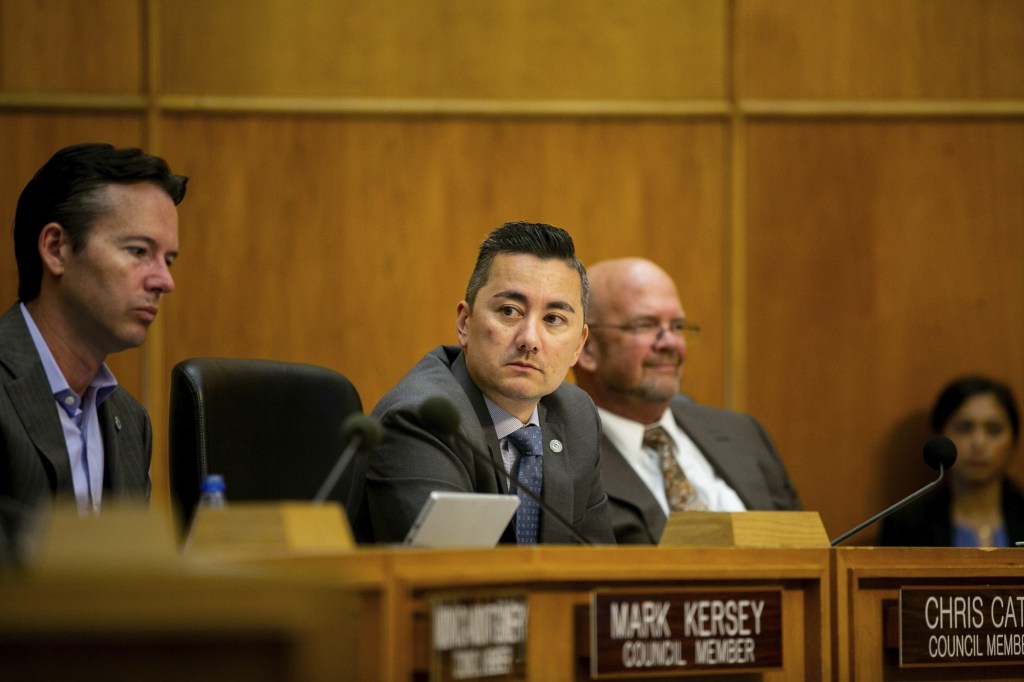Three weeks into the job, the new CEO of the Regional San Diego Chamber of Commerce is looking to make some noise.
“People are going to hear more about where the chamber stands because we’re going to be louder,” said Chris Cate, a former San Diego City Council member and head of the San Diego County Taxpayers Association.
Cate officially started at the chamber on June 1 and in an interview last week said the organization would take a more aggressive posture moving forward.
“Policymakers should expect the full brunt of the chamber on what it supports or opposes” he said.
Cate said the chamber would step up its political support on policy issues and candidates that support a pro-business agenda. The chamber has long been active in those areas, though sometimes more than others. To what degree that changes under Cate, of course, remains to be seen.
He declined to get into specifics, saying he’s “not going to get ahead of the (chamber) board.” But Cate mentioned obvious areas of interest such as housing, infrastructure, regulations, taxes and fees, trade and the overall cost of living.
He is replacing Jerry Sanders, who stepped down as the chamber CEO after 12 years and previously served as San Diego’s mayor and police chief.
Cate takes over at a time the business community is facing increasing headwinds on a number of fronts.
The San Diego City Council and Mayor Todd Gloria recently agreed to roll back the city’s permissive ordinance on accessory dwelling units.
On its face, the action was taken to close loopholes that in some cases allowed dozens of backyard apartments on formerly single-family-home lots. But it was the first major pause in the city’s steady pro-development march that was fueled by the notion that making it easier to build more homes would moderate housing prices.
Further, the changes included more requirements and likely added costs to developers.
The development community has long been frustrated by what they see as a lack of support for increased housing at the county and in some other cities.
Meanwhile, the council is moving forward with a broad proposal to create a $25 hourly minimum wage for workers in the tourism industry, which would apply to “event centers” that could include Petco Park. The current citywide minimum wage is $17.25.
That proposal comes from Councilmember Sean Elo-Rivera, who has a sweeping agenda aimed at addressing what he says is an imbalance in local policies that benefit corporations, especially those based out of town, and tourists at the expense of struggling San Diegans.
He contends businesses don’t fully cover the costs they incur for the city but should. He also said non-residents should pay to park at beaches and parks, and that companies should do more to sponsor libraries, parks and recreation centers.
Finally, the city has been seeking more revenue by renegotiating leases on public property and facilities that Gloria said had provided an inadequate return.
What’s fair and what’s best for the region here may be in the eye of the beholder. Business and particularly the tourism industry maintain they are an economic driver for the region that additional costs would only diminish.
Whether or not companies have been getting too good of a deal, the bottom line is collectively such moves would make it more expensive to do business in San Diego.
All this and more are on Cate’s plate now.
The chamber’s political approach has had to adapt to the political changes in San Diego over the years. Often described as a center-right organization, the chamber in the past tended to support Republican causes and candidates, and faced off with organized labor and Democrats.
That’s not pragmatic in what has become a Democratic town, shifting from its Republican past. Right now, the mayor and all nine City Council members are Democrats, yet they are far from being in lock-step and some are more business-friendly than others.
Cate was the last Republican on the council, and jokingly referred to himself as “a Jeopardy question.” But he had a reputation of working with Democrats and served as chair of the influential budget committee, despite a Democratic majority on the council.
More recently, he led a public policy consulting company called 3MC Strategies and helped shape political strategy for the Building Industry Association of San Diego.
Currently, the chamber’s political arm is investing in an independent committee supporting Chula Vista Mayor John McCann, a Republican, in a special election for an open county supervisor seat against Imperial Beach Mayor Paloma Aguirre, a Democrat who is supported by organized labor.
But Cate doesn’t see a business-labor divide as absolute. For example, he said policies to expedite housing construction provide “some opportunities to align” with unions.
More than once in the interview Cate stressed the chamber is “nonpartisan.” The list of Democratic endorsements over the years has grown, mirroring at least somewhat the political demographic trend in the region.
Navigating today’s politics can be tricky and may seem counterintuitive.
In the 2020 mayoral election, the chamber endorsed Gloria against fellow Democrat Barbara Bry, then a council member who previously made her mark as a successful entrepreneur. Organized labor also backed Gloria.
Donald Trump was broadly backed by Republicans and business interests, yet the chamber and the business community at large have expressed serious concerns about the impact the president’s tariffs will have on the local economy. Cate didn’t see the chamber backing off there.
“I don’t think so,” he said. “We’ll be calling balls and strikes.”
But Cate said the chamber will be developing a three- to five-year strategy for policy initiatives and politics. That includes the 2028 mayoral election, when a Democrat again is likely to be favored — and maybe two.
What they said
“This should anger every American.”
Jennifer Griffin, Fox News chief national security correspondent, reacting to a San Diego story headlined “ICE detains U.S. Army interpreter at routine asylum hearing.”
